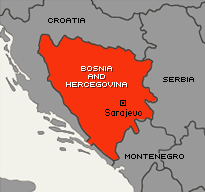Bosnia and Herzegovina still considered a thorn in EU's side
Corruption, arms smuggling and sex slavery are still prospering in the region and raise serious concerns with European politicians
The 10th anniversary of the Dayton agreements, which helped bring one of the bloodiest Balkan conflicts to an end, attracted the world's attention to Bosnia and Herzegovina (BiH) again. The US administration believes that BiH are capable of solving the remaining problems for the sake of the cherished goal – the EU membership. 
It may seem strange, but US officials with Undersecretary of State for Political Affairs Nicolas Burns at the head, believe that the present-day triumvirate can be replaced with a centralized government and the parliament before the elections (slated to take place next year). Washington thus reminds that the Dayton agreements were only a transition stage on the way to the establishment of the Bosnian state structure and the republic's membership in the European Union.
Representatives of ethnic groups – Bosnians, Croatians and Serbs – came to agreement last week to change the national constitution by March of the next year. Statesmen have already started negotiations with EU officials to sign the agreement of stabilization and association.
Despite the gradual improvement of the general state of affairs in the country, none of the ethnic groups is ready to retrieve erstwhile relations, which used to be common in the 1990s. It could be explained with an aspiration of Croatian nationalistic groups to not to lose power in the country. The Serbs in their turn do not wish to be deprived of the rights, which they obtained as a result of the conflict in 1993-1995. More importantly, the Serbs stand firm for the Serbian Republic – their own territory, which appeared on the map of the world after the crisis in Yugoslavia.
Bosnia and Herzegovina are economically weak nowadays. About 40 percent of the nation's population is unemployed; some 18 percent of the four-million-strong country live below the poverty line.
The international community pins hopes on reforms discussed last week in Brussels. The reforms are meant to attract foreign capitals to South-Eastern Europe. Corruption, arms smuggling and sex slavery are still prospering in the region and raise serious concerns with European politicians.
The ongoing distribution of Islamic terrorism in the Balkans is also a highly important issue. The International Herald Tribune paid special attention to it when reporting a series of arrests in Sarajevo's suburban town. The Balkan countries have virtually become a transfer point for Mideastern terrorists on their way to Europe.
Specialists say that diasporas of immigrants in Central Europe, which have recently caused serious problems for local governments, and Balkan organizations maintain close ties with each other. The investigation of terrorist acts, which shocked London in July of the current year, has proved such an assumption. It was determined that the explosives, which were used for the explosions in the London Tube, had been stolen from military warehouses of the Yugoslavian army and delivered to Great Britain from the southern Serbian province of Kosovo. This fact made British special services sort out relations with Belgrade. It was particularly said that there was a certain Balkan-based terrorist network, which organized the London bombings.
It is obvious that the intense situation in Kosovo, the status of which is set to be identified next year, may exert a serious influence on the current events in Bosnia. All the Balkan countries face the dilemma of demarcation. It does not mean, however, that the common problem requires one solution. The Dayton agreements were developed to regulate the conflict in Bosnia: they cannot be used in Kosovo.
”The international recognition of Kosovo's independence will give rise to a chain of dramatic changes in the Balkan region,” Serbia and Montenegro's Foreign Affairs Minister Vuk Draskovic said after a suggestion from the Serbian President to divide Kosovo on the base of the ethnic principle. Possible consequences must be necessarily taken into consideration during the conflict-regulating process, Belgrade officials believe.
Most likely, Sarajevo will not rush to take immature decisions. Dan Fried, Assistant US Secretary of State for European and Eurasian Affairs, stated after the meeting with Bosnia and Herzegovina's ethnic leaders: "We decided not to get into specifics (in the agreement) or else the whole thing would fall apart," he said. "The overall import of all of this is to put Bosnia on a road going to Europe. If you want the slogan, it's from Dayton to Brussels."
Vladimir Yaduta
Discuss this article on Pravda.Ru ENGLISH FORUM
Subscribe to Pravda.Ru Telegram channel, Facebook, RSS!





